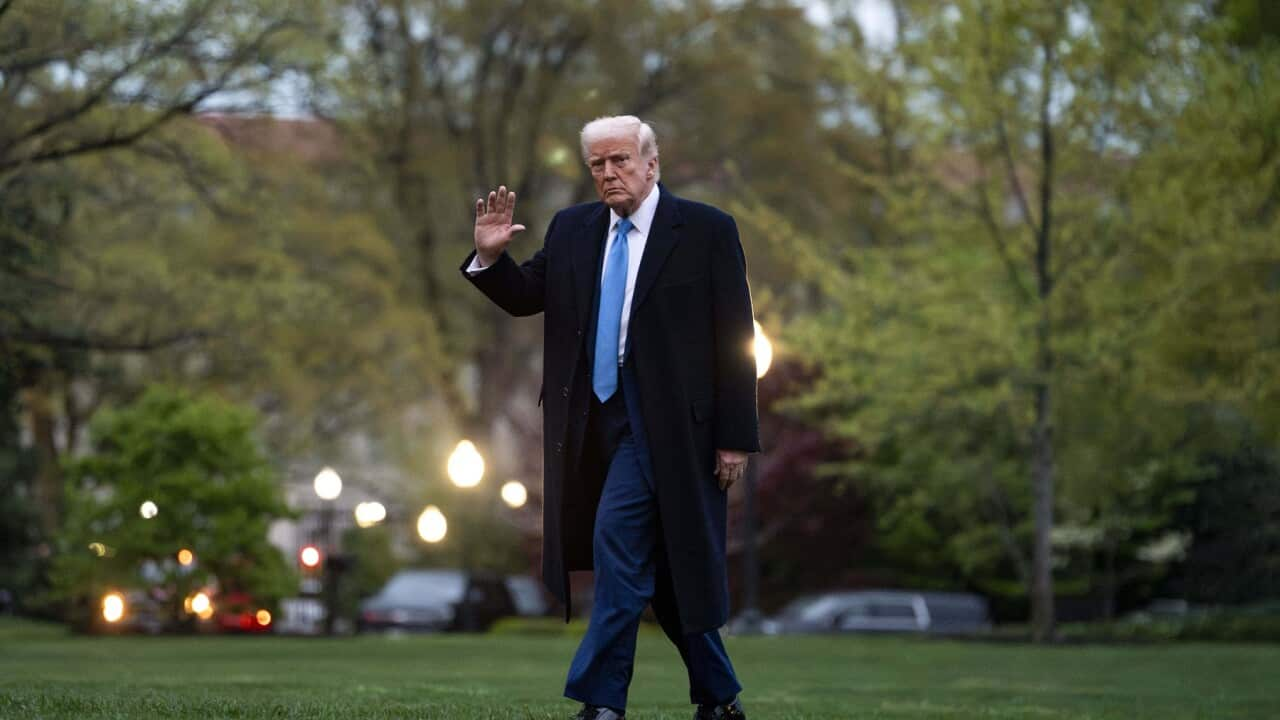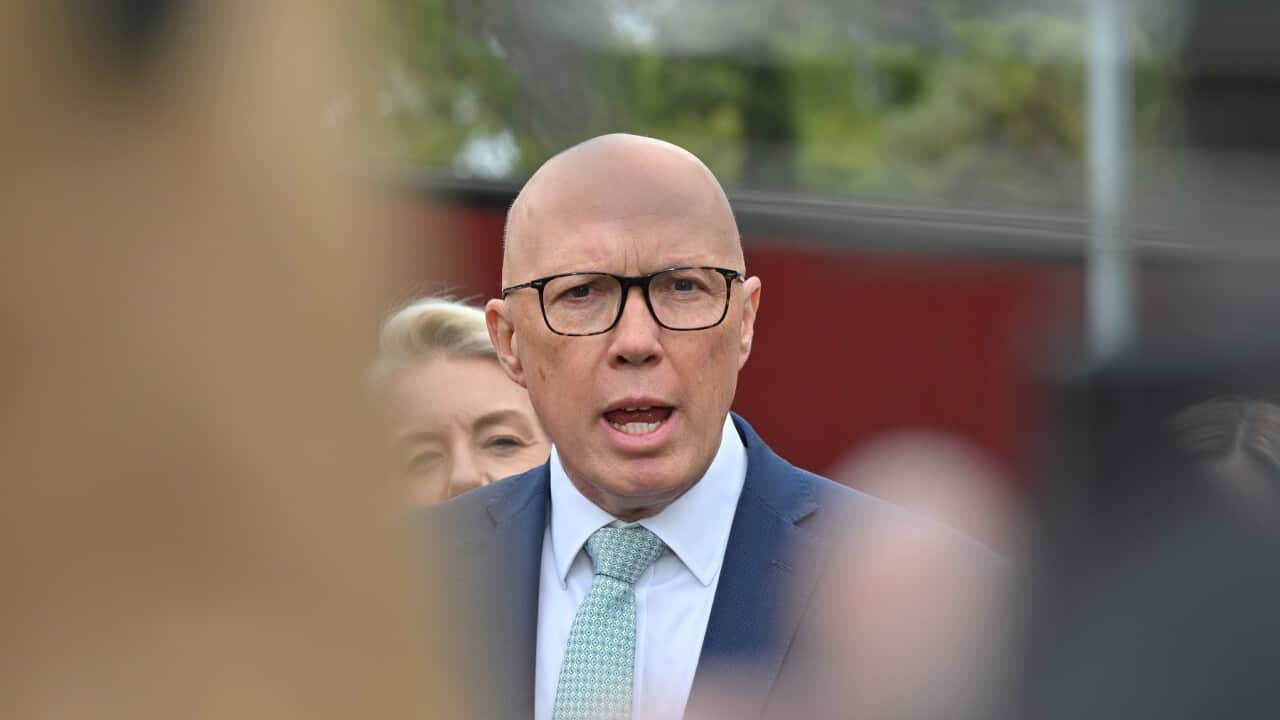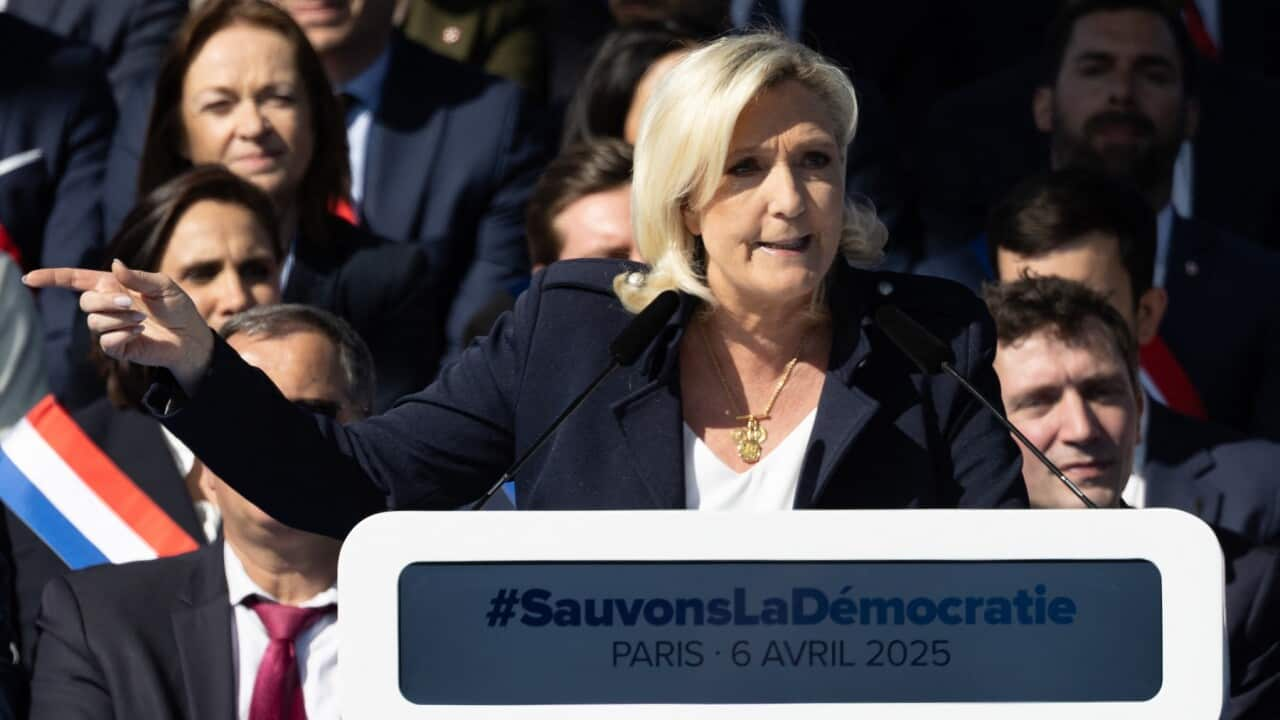TRANSCRIPT
[ANTHONY ALBANESE: "The administration's tariffs have no basis in logic, and they go against the basis of our two nations partnership."
MARK CARNEY: "We will fight the US tariffs, with retaliatory trade actions of our own, that will have maximum impact in the United States. "
URSULA VON DER LEYEN: "If you take on one of us, you take on all of us. So, we will stand together and stand up for each other. Our unity is our strength."
Last week, U-S President Donald Trump jolted the world by announcing a slate of new tariffs, and disrupting a decades old global trade order.
With some tariffs already in place and others set to come into effect later this week, U-S officials say more than 50 nations have already reached out to begin negotiations.
Boarding Air Force One, Mr Trump described his tariffs as a type of medicine, and says foreign governments will have to pay a lot of money to lift them.
Speaking to A-B-C America, U-S Treasury Secretary Scott Bessent says decisions on potential concessions are up to the president.
“But I can tell you that, as only he can do at this moment, he's created maximum leverage for himself. And more than 50 countries have approached the administration about lowering their non-tariff trade barriers, lowering their tariffs, and stopping currency manipulation. And they've been bad actors for a long time, and it's not the kind of thing you can negotiate away in days or weeks.”
Last week's tariff announcement fulfilled a key campaign promise from Donald Trump, who has long denounced foreign trade deals as unfair to the United States.
The announcement, his most expansive on tariffs yet, will see a baseline tariff of 10 per cent on all foreign goods imported into the United States.
That baseline 10 per cent will be supplemented in certain cases by additional reciprocal tariffs that vary by nation.
Joseph Williams is a former senior editor of U-S News and World Report.
He says the measures raise the risk of a recession.
"I certainly think prices are going to increase in the United States. There's going to be rising voter anger -- probably a recession could be triggered -- that will ripple around the world, because production around the world will decrease as American consumption decreases. So I think it's going to drive everybody into a race towards the bottom. We will be looking at five percent or more unemployment in the United States. We'll be looking at, probably, a mild recession heading into a deeper recession, if one has not already occurred."
Already announcing retaliatory measures, China says it will be imposing 34 per cent tariffs on all U-S imports.
The Chinese market was singled out by the trade policy, with Mr Trump imposing an additional 34 per cent tariff for China, on top of the previously announced 20 per cent.
Even Japan, a key ally of the U-S in Asia, was hit with a 24 per cent tariff and dubbed by Mr Trump as one of the worst offenders for unfair trade practices.
Takuji Okubo is the managing director and chief economist at Japan Macro Advisors.
He says while there will be obvious negative impacts on the economy, this may lead to stronger regional co-operation in Asia.
"Economically, obviously it's bad. But I think this is one challenge. This challenge against Trump's tariff policy is, I think this actually provides a common ground between Japan, China, South Korea and of course the EU. So this is a common challenge for all these countries where we can have some uniting ground. I think I'm actually jumping ahead to the next topic, from a geopolitical point of view, this could actually help ease the tension in Asia."
Already, Chinese state media has signalled that China, Japan, and South Korea they may work together to try and counter the tariffs- no small move, considering they are all major export economies who do a lot of trade with the U-S, and the historic enmity between these three nations.
European governments are also reeling from the announcement.
The 27-nation European Union bloc is facing a 25 per cent tariff on steel and aluminium as well as cars, and will also be hit with a 20 per cent tariff on almost all other goods from Wednesday [[9 apr]].
The tariffs cover around 70 per cent of the E-U's exports to the U-S.
E-U members are expected to present a united front in the coming days, with reports that approval is likely for countermeasures on around $45 billion [[USD$28B]] worth of U-S imports.
Italian Prime Minister Giorgia Meloni says her government is ready to support those impacted.
ITALIAN THEN ENGLISH VO: "We are governing at probably the most difficult time since the post-war period. A little bit of everything has happened and is happening. We will also address the issue of tariffs, with determination and pragmatism, without alarmism. Of course, we did not agree with the choice of the United States, but we are ready to deploy all the instruments - negotiations and economic - needed to support our businesses and the sectors that will be penalised."
Global stock markets were hit hard by the announcement, with $5 trillion U-S dollars wiped from the stock market value for S&P 500 companies by last week's close.
Since China announced countermeasures, the U-S stock market has slipped into its worst crisis since March 2020, which was the start of the COVID-19 pandemic.
The Australian share market has taken its biggest hit in over a year, with the top 200 companies opening more than six per cent lower in the first few minutes of trade.
The Australian dollar has also dropped below 60 US cents for the first time since COVID, while also experiencing the biggest daily fall in 17 years.
Prime Minister Anthony Albanese says the government is continuing to engage diplomatically with the U-S, while also considering other options.
"Well, what we're doing is preparing for further uncertain times. We do live in uncertain times. And part of that is the impact of global changes, including the tariffs decision that was made by the US administration last week. You can't change global events, what you can do is prepare for them."
As fears of a global recession mount, U-S Treasury Secretary Scott Bessent says it doesn't have to end that way.
"I reject that assumption. There doesn't have to be a recession. Who knows how the market is going to react in a day, in a week. What we are looking at is building the long-term economic fundamentals for prosperity that I think the previous administration had put us on the course toward financial calamity.”
In the U-S Congress, where the Republican Party has long championed free trade, the tariff regiment has been met with both applause and unease.
Several Republican senators have already signed onto a new bipartisan bill that would require presidents to justify new tariffs to Congress.
Congress would then have to approve the tariffs within 60 days, or they would expire.
Director of the National Economic Council of the United States, Kevin Hassett, says media outlets are exaggerating the impacts.
"There is kind of like a logical disconnect between the stories, the competing stories that your team is using to attack President Trump, on the one hand, you are saying the countries are really angry, and they are going to have to retaliate on the other hand you are saying that consumers are going to have to bear the cost and it is going to drive inflation up. If US consumers are going to bear the cost there is no reason for the countries to be angry."
Radhika Desai is the director of the Geopolitical Economy Research Group.
She says that, in the long term, more and more countries are going to shift away from trade with the U-S.
"The one thing we can be sure of is that these tariffs and the revenue they will allegedly bring to the US government will be used as a justification to give huge tax cuts to the rich in the United States. And I think this is going to be the first most important consequence and the most certain consequence of this, that is, ordinary Americans, working Americans will pay for a tax cut that will be enjoyed by a small number. But I would say that the long run effect of this is bound to be that more and more countries will shift their trade away from the United States."













